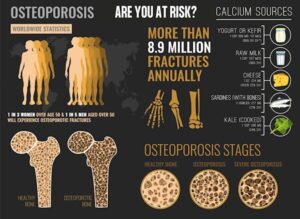As we grow older, it becomes even more important to take care of our bones. In this article, we will explore some simple yet effective ways to maintain bone health as you age. By making a few lifestyle changes and incorporating certain habits into your daily routine, you can ensure that your bones stay strong and healthy for years to come.
Curious to know more about how you can maintain bone health as you age? In our article, we will discuss the importance of calcium and vitamin D in promoting bone strength, as well as the role of exercise in maintaining bone density. We will also delve into the impact of certain lifestyle choices, such as smoking and excessive alcohol consumption, on bone health. Additionally, we will provide you with practical tips and strategies to incorporate into your daily life to keep your bones strong and resilient. So, read on to discover how you can take control of your bone health and age gracefully with strong, healthy bones. As you age, it is important to prioritize your bone health to prevent fractures and maintain a good quality of life. Understanding the key factors affecting bone health, adopting proper nutrition and exercise habits, avoiding bone-damaging habits, maintaining a healthy lifestyle, ensuring adequate hormonal balance, preventing osteoporosis, implementing fall prevention strategies, and managing medications can all contribute to maintaining strong and healthy bones as you age.

This image is property of www.elcaminohealth.org.
Understanding Bone Health
What is bone health?
Bone health refers to the strength and density of your bones, which is crucial for overall well-being. Bones provide support, protect vital organs, and enable mobility. They are living tissues that constantly undergo a process called remodeling, where old bone is replaced with new bone. A balance between bone formation and bone resorption is necessary for optimum bone health.
Why is bone health important?
Maintaining good bone health is vital because bones tend to become weaker and more susceptible to fractures as you age. Bones reach their peak density in your 30s, after which bone mass gradually decreases. If proper care is not taken, this loss of bone mass can lead to conditions like osteoporosis, where bones become thin and brittle, increasing the risk of fractures, especially in the hip, spine, and wrist.
Factors affecting bone health
Several factors can influence your bone health. These include age, gender, genetics, hormonal changes, lifestyle choices, and certain medical conditions. Women tend to be at a higher risk of developing osteoporosis due to hormonal changes during menopause. Additionally, certain chronic conditions, medications, and a sedentary lifestyle can also negatively impact bone health.
Nutrition for Strong Bones
Importance of calcium intake
Calcium is a crucial mineral for bone health. It is the main component of bone tissue and helps maintain bone strength and density. Adequate calcium intake throughout your life is essential. Dairy products, such as milk, cheese, and yogurt, are excellent sources of calcium. Other sources include soy products, fortified plant-based milk, leafy green vegetables, and nuts. Aim for a daily calcium intake of 1000-1200 mg, depending on your age and gender.
Vitamin D and its role in bone health
Vitamin D is important for calcium absorption and utilization in the body. It helps maintain appropriate levels of calcium and phosphate in the blood, allowing for proper bone mineralization. Sun exposure is the primary source of vitamin D, but it can also be obtained through fortified foods like cereal, orange juice, and fatty fish, or through supplements. Aim for 600-800 IU of vitamin D daily, depending on your age and risk factors.
Other essential nutrients for bone health
Besides calcium and vitamin D, other nutrients play a role in maintaining bone health. Vitamin K helps regulate calcium and promotes bone mineralization. Good sources include kale, spinach, broccoli, and Brussels sprouts. Magnesium is important for bone structure and strength. Green leafy vegetables, nuts, seeds, and whole grains are good sources. Phosphorus, zinc, copper, and vitamins C and B12 are also essential for bone health and can be obtained through a balanced diet.
Exercise and Physical Activity
Weight-bearing exercises for bone strength
Engaging in weight-bearing exercises can help strengthen your bones. These activities require you to work against gravity, which stimulates the bones to rebuild and become stronger. Walking, jogging, dancing, and climbing stairs are excellent weight-bearing exercises that are low impact and easy to incorporate into your daily routine.
Muscle-strengthening exercises for bone health
Strengthening your muscles also helps improve bone health as stronger muscles provide better support and protection for your bones. Resistance training exercises using weights, resistance bands, or bodyweight can help build and maintain muscle mass. Squats, lunges, push-ups, and bicep curls are examples of muscle-strengthening exercises that target different muscle groups.
Balance and flexibility exercises for preventing falls
Maintaining good balance and flexibility is important for preventing falls and reducing the risk of fractures. Exercises like tai chi, yoga, and Pilates can help improve balance, flexibility, and coordination. These exercises also promote a strong core, which contributes to better stability and reduces the risk of falls.
Avoiding Bone-Damaging Habits
Impact of smoking on bone health
Smoking has detrimental effects on bone health. It accelerates bone loss, decreases calcium absorption, and impairs the production of calcitonin, a hormone that helps regulate calcium levels. Furthermore, smoking interferes with the healing process, making fractures more difficult to recover from. Quitting smoking is essential for maintaining bone health and overall well-being.
Excessive alcohol consumption and bone health
Excessive alcohol consumption can have negative impacts on bone health. It interferes with the body’s ability to absorb calcium, decreases bone density, and impairs bone formation. Limiting alcohol intake to moderate levels is recommended. For women, this means up to one drink per day, and for men, up to two drinks per day.
Effect of sedentary lifestyle on bone health
A sedentary lifestyle can negatively affect bone health as lack of physical activity leads to decreased bone density and strength. Sitting for long periods without weight-bearing or muscle-strengthening activities can contribute to bone loss. Incorporating regular exercise, as mentioned earlier, and staying physically active throughout the day can help maintain bone health.
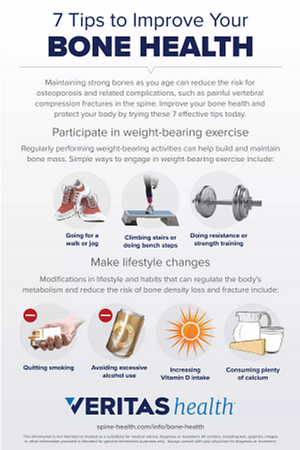
This image is property of veritas.widen.net.
Maintaining a Healthy Lifestyle
Importance of a balanced diet
Maintaining a balanced diet is crucial for overall health, including bone health. A diet rich in fruits, vegetables, whole grains, lean proteins, and healthy fats provides essential nutrients required for optimal bone health. Avoid excessive consumption of processed foods, sugary beverages, and excessive salt, as they can have negative effects on bone health.
Getting regular medical check-ups
Regular medical check-ups can help detect any potential underlying health conditions that may affect bone health, such as hormonal imbalances or vitamin deficiencies. Routine check-ups can also ensure that any existing conditions are properly managed, minimizing their impact on bone health. Talk to your healthcare provider about appropriate screening and follow-up schedules.
Managing chronic conditions that affect bone health
Some chronic conditions, such as rheumatoid arthritis, inflammatory bowel disease, and certain hormonal disorders, can impact bone health. Proper management of these conditions with the help of healthcare professionals is important. This may involve medication, lifestyle modifications, and regular monitoring of bone health to prevent further bone loss.
Ensuring Adequate Hormonal Balance
Impact of hormonal changes on bone health
Hormonal changes play a significant role in bone health, particularly in women. During menopause, the decline in estrogen levels accelerates bone loss and increases the risk of osteoporosis. Hormonal imbalances in both men and women can also affect bone density. Consult with a healthcare professional to assess your hormonal health and discuss appropriate treatment options.
Treatment options for hormone-related bone loss
Hormone replacement therapy (HRT) is a common treatment option for hormone-related bone loss, especially for women experiencing menopause. HRT involves the use of estrogen or a combination of estrogen and progestin to replace the hormones that decline during menopause. However, the decision to undergo HRT should be made after considering individual health factors and potential risks, which should be discussed with a healthcare provider.
Consulting a healthcare professional for guidance
Seeking guidance from a healthcare professional is crucial for maintaining bone health as you age. They can provide personalized advice based on your medical history, risk factors, and specific needs. Regular check-ups and open communication with your healthcare provider can help you stay informed and take proactive steps to maintain bone health.
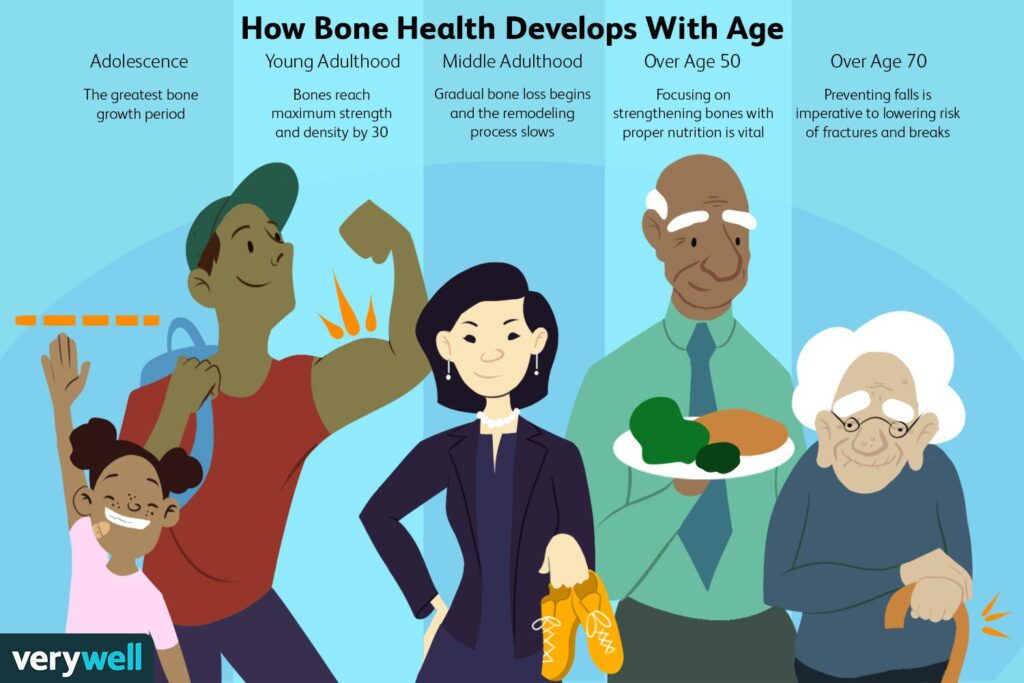
This image is property of www.verywellhealth.com.
Preventing Osteoporosis
Understanding osteoporosis and its risk factors
Osteoporosis is a condition characterized by low bone mass and deterioration of bone tissue, leading to an increased risk of fractures. Understanding the risk factors for osteoporosis, such as age, gender, family history, hormonal imbalances, and certain chronic conditions, can help in taking preventive measures to reduce the risk of developing this condition.
Preventive measures for osteoporosis
Prevention of osteoporosis includes adopting a healthy lifestyle, as mentioned earlier, along with certain preventive measures. These include avoiding excessive alcohol consumption, quitting smoking, maintaining a healthy weight, and ensuring proper intake of calcium and vitamin D. Regular exercise, especially weight-bearing and muscle-strengthening activities, helps promote bone health and reduce the risk of osteoporosis.
Screening and early detection of osteoporosis
Screening for osteoporosis through bone density testing can help identify individuals at a higher risk of fractures. Early detection allows for appropriate interventions, such as lifestyle modifications, medications, and regular monitoring, to prevent further bone loss and reduce the risk of fractures. Talk to your healthcare provider about the recommended screening guidelines based on your age, gender, and risk factors.
Fall Prevention Strategies
Creating a safe home environment
Making your home environment safe and free from hazards is crucial for preventing falls and fractures. Ensure adequate lighting, remove clutter, secure rugs, install grab bars in bathrooms, and ensure that stairways and walkways are well-maintained with handrails. Making these simple modifications can significantly reduce the risk of falls.
Assistive devices for mobility and balance
Incorporating assistive devices can provide added support and stability, reducing the risk of falls. Canes, walkers, and wheelchairs can assist those with mobility issues, while walking aids, such as trekking poles, can improve balance during outdoor activities. Consult with a healthcare professional or physical therapist to determine the most appropriate assistive devices for your needs.
Regular eye check-ups for visual health
Maintaining good visual health is essential for preventing falls. Regular eye check-ups can detect any vision changes that may increase the risk of accidents and falls. Wearing appropriate prescription eyewear, keeping eyeglasses clean, and ensuring proper lighting can all contribute to maintaining good visual health and reducing the risk of falls.
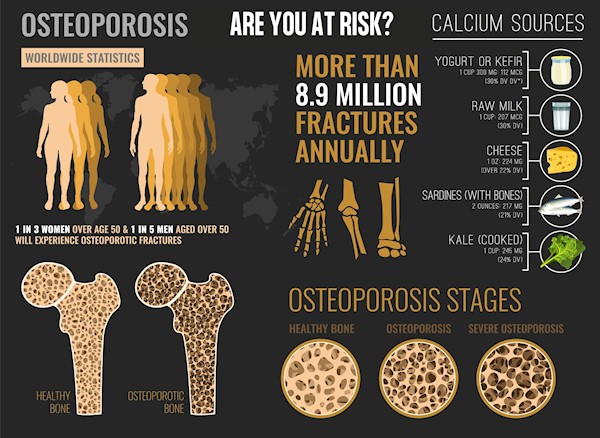
This image is property of bonejoint.s3.amazonaws.com.
Managing Medications
Potential bone-damaging effects of certain medications
Certain medications, such as corticosteroids, anticonvulsants, and some cancer treatments, can have negative effects on bone health. Consult with your healthcare provider or pharmacist to understand the potential bone-damaging effects of any medications you are taking. They can suggest strategies to minimize these effects or explore alternative treatments if necessary.
Consulting doctors or pharmacists about bone health
When prescribed medications, it is important to discuss their potential impacts on bone health with your healthcare provider or pharmacist. They can provide information on any specific precautions, dietary recommendations, or lifestyle modifications that may help mitigate potential bone-damaging effects. Open communication with your healthcare team is essential for optimal bone health.
Finding alternative treatments if necessary
In some cases, alternative treatments may be available that have a lower risk of damaging bone health. It is important to discuss these options with your healthcare provider to determine the most appropriate course of treatment. Balancing the benefits and risks of a medication or treatment is crucial for maintaining overall health, including bone health.
Conclusion
Maintaining bone health as you age requires a proactive approach. By understanding the factors affecting bone health, adopting a proper nutrition and exercise regimen, avoiding bone-damaging habits, maintaining a healthy lifestyle, ensuring hormonal balance, preventing osteoporosis, implementing fall prevention strategies, and managing medications wisely, you can take control of your bone health and prevent fractures. Remember to consult with a healthcare professional for individualized guidance based on your specific needs and risk factors. With the right strategies and support, you can age gracefully while maintaining strong and healthy bones.
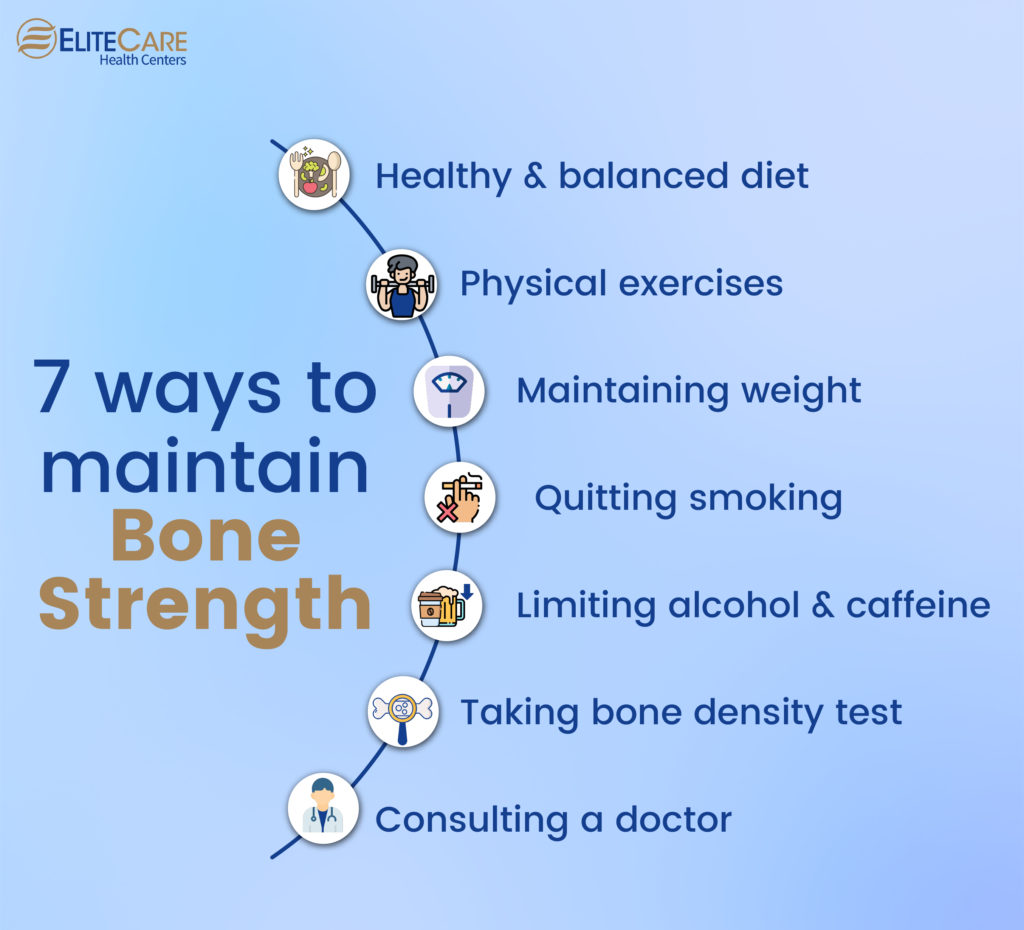
This image is property of www.elitecarehc.com.

